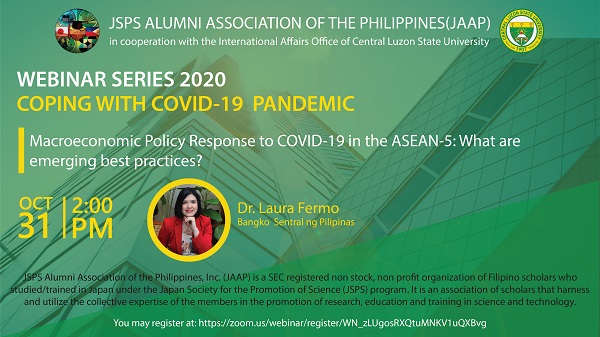On 31 October 2020, the 3rd lecture of WEBINER SERIES 2020 “COPING WITH COVID-19 PANDEMIC”, was held by JSPS Alumni Association of the Philippines (JAAP) in cooperation with the International Affairs Office of Central Luzon State University.
The lecture was opened by a welcome address by Dr. Renato G. Reyes, President of JAAP followed by the remarks by Dr. Yoshio Otani, Director of JSPS Bangkok Office.
Then, Dr. Laula Fermo, Bangko Sentral ng Pilipinas, made a presentation entitled “Macroeconomic Policy Response to Covid-19 in ASEAN-5: What are emerging best practices?”
For this lecture, about 380 participants attended and many questions were raised after the presentation.
Finally, Dr. Danilda H. Duran, JAAP Vice President delivered closing remarks, thanking everyone involved in this seminar.
Abstract of the Lecture
Preventing the spread of COVID-19 has a lot to do with pre-COVID conditions. Higher income countries’ financial response and state and quality of public health capabilities–in terms of spending on research and health needs and both fiscal and monetary stimulus alike—were comparatively larger than in emerging Asian countries, including the ASEAN-5. But income levels and the state of public health of a country is a necessary but not sufficient condition for the relative success in mitigating COVID 19’s detrimental effects. The success in bringing down cases and deaths to zero was not solely determined by income nor the magnitude of public spending or even the existing quality of public health services and vaccine research, and this can be gleaned from global rankings of responses and best practices. Effective and rapid use of NPIs; more focused, community-based testing and then contact-tracing; and fact-based communication were the main reasons identified in various studies as the determinant why several ASEAN countries were more successful in combatting the pandemic than others, even when compared to more advanced economies. Various international institutions have developed measures gauging the overall response to COVID-19 across different countries. The bases for the measure naturally affects the resulting ranking. A cobweb approach is presented in this study which can help organize and summarize the different factors being considered in these measures, the ranking of countries, and how they evolve over time. What is largely missing in many of these assessments though, is the inclusion of the role of transparent COMMUNICATION in accounting for the relative success of these ASEAN countries that have even outranked more advanced economies. We therefore propose in this study using deep linguistic analyses using an AI software as a preliminary approach to assess and add a “score” for the transparency and effectiveness of fiscal and monetary policy communication and include it as a critical success factor in the COVID-19 Government Response Index.










